8+ Sample SEO Client Proposal
-
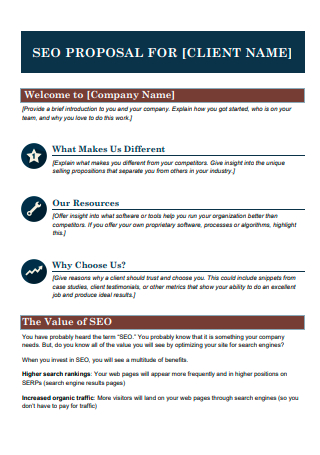
SEO Client Proposal Template
download now -
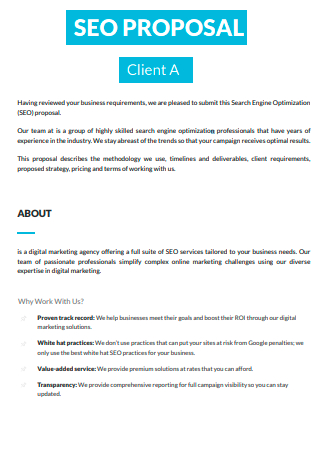
Basic SEO Client Proposal
download now -
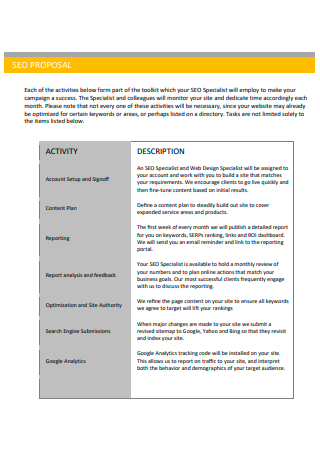
SEO Client Proposal Example
download now -
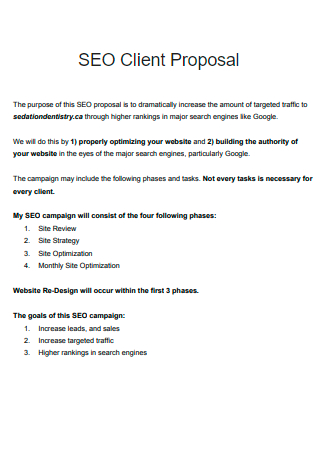
Printable SEO Client Proposal
download now -
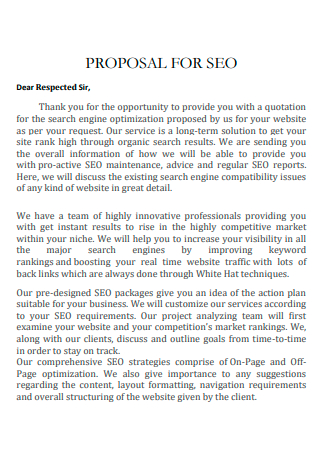
SEO Client Proposal in PDF
download now -
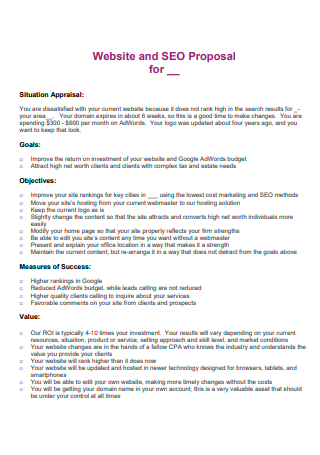
Website and SEO Client Proposal
download now -
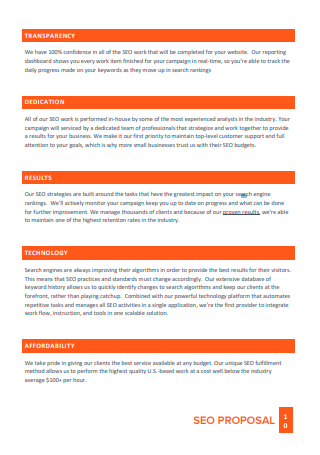
Standard SEO Client Proposal
download now -
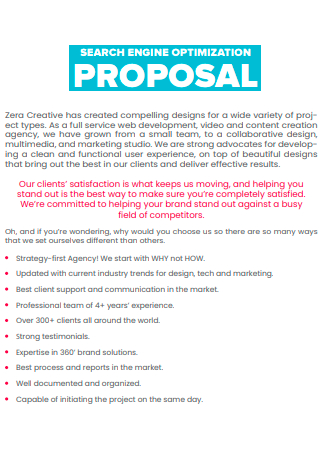
Formal SEO Client Proposal
download now -
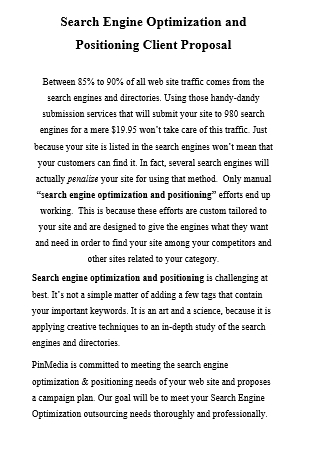
SEO Client Proposal in DOC
download now
What Is an SEO Proposal?
An SEO proposal is an opportunity for an SEO agency to convince prospective clients that they offer the most effective solution to their problems. Therefore, agencies should create a concise, actionable, and simple-to-understand proposal that informs the client of what to expect and when. Use an SEO proposal template and alter it based on the client’s website and objectives, or design a custom proposal for each client. Whether you’re a freelancer or a marketing agent offering SEO services, you should be aware of what should be included in your SEO proposal to persuade clients that you’re the ideal fit for them. According to the statistics, only 14% of respondents indicated that 85% of their initiatives are successful SEO outcomes for their clients. 22.5 percent reported that less than 30 percent of their SEO campaigns are deemed successful by their clients.
Benefits of SEO
The magnificence of search engine optimization is that anyone can do it and it is more accessible than you may imagine. Instead of spending on traditional print ads or sponsored posts, understanding SEO fundamentals and potentially investing in a few technologies can result in higher long-term value for your company. Below are reasons you should consider for your organization.
Elements of a Good SEO Proposal
75% of users will not scroll the first search engine results page. Businesses must ensure their content ranks highly by implementing good SEO to attract attention. Every SEO proposal has specific components that demonstrate to the prospective client that you can bring value to their SEO process. Whether you are utilizing a paid or free SEO proposal template, you must include each of the following components:
1. Overview and Summary
Your SEO proposal must always begin with an explanation of why you are writing it and an executive summary. You should outline the client’s issue and how you might assist them. In addition, your executive summary should demonstrate to the client what they lack in their current state. You can show them, for instance, the organic traffic they are missing or their poor SERP rank due to a lack of SEO.
2. Pitch for Your Company
You are confident that your company can deliver a tailored SEO strategy and improve the client’s ranking because you have already done so for multiple clients. However, the client is unaware of this information, so you must communicate it to them. Instead of saving a great deal of time describing your SEO agency’s many accolades, use case studies of your former clients to demonstrate what you have to offer.
3. Determine the Client’s Issue
Even though the client’s problem was explained in the executive summary, you need to go more in-depth. You should use data and statistics to show the client how much money they are missing out on and how much they can save on marketing with better SEO. But be careful not to confuse your clients with math that is hard to understand. Instead, use the data to show them how much they are making now and how much more they can make with your SEO services. Some research would be helpful here because you need to know the client’s current conversion rate and the average number of searches for their primary target keywords.
4. Propose Solutions
Now that it is evident that the client’s business has issues, you should provide solutions, which is where you market your service. Consider the client’s website needing an SEO audit or improved keyword research. Now is the time to inform them using plain, primary language they can comprehend. As you present solutions, strive to demonstrate the value your specific solution will provide compared to alternatives they may be considering.
5. Project Timeline and Cost
Don’t forget to provide the client with project schedules and pricing estimates. Let them know how long it will take you to complete the tasks; the most effective approach is to divide the task into milestones and provide a particular schedule. To clarify what the client is paying for in the cost estimates, you should include a breakdown of your fees. Also, remember to include taxes when estimating the cost, and inform the client if discounts are available for specific services.
How To Hire an SEO Specialist
An expert in search engine optimization (SEO) can be an indispensable member of a marketing department. You may be involved in hiring if you are a marketing or human resources manager or employee. Recruiting an SEO professional can help you find the most qualified individual for your organization. You may carry out these tasks if you work for a small business. In larger organizations, hiring or marketing managers may outsource specific responsibilities to other team members. Here is a step-by-step strategy for hiring an SEO expert:
1. Learn about SEO
Learning the fundamentals of SEO can help you draft a job description, create unique interview questions, and find qualified individuals. Knowing SEO will allow you to debate SEO techniques with applicants and comprehend their company advice. Online SEO training materials may educate you on fundamental SEO ideas so you can confidently discuss SEO.
2. Advertise the vacant role
Publicize the open position to let SEO specialists know you require their services. Clarify in your SEO job description whether the work is full-time or part-time and whether it is a permanent or temporary position. Describe the organization and the SEO professional’s responsibilities. Identifying necessary and recommended criteria assists candidates in determining whether they are qualified for a class. Reading other SEO specialist job postings can assist you in writing your own.
3. Investigate the top candidates
By sifting through your job applications, identify individuals who appear to possess the SEO abilities and expertise stated in your job description. Conduct online research to discover more about them. If candidates have websites, evaluate where they rank in search engine results. High search engine ranks demonstrate that the candidate can effectively implement SEO techniques. They are likely to create comparable results for your organization. Consider soliciting testimonials from delighted customers. These testimonies may be on the candidate’s website, social media accounts, and review websites. Identify applicants who have contributed to the expansion of firms and have been simple to work with. Search online for each candidate’s clientele using the company’s name and search terms a client may enter into a search engine. For instance, a butcher may wish to rank highly for the phrase “best butcher near me.” If the client appears prominently in the search engine results, the SEO expert has performed admirably. Create a list of the applicants who impressed you the most.
4. Interview top candidates
Contact the finalists and meet them at the office for an interview. Plan your interview questions to ensure you obtain the necessary information to make the best selection. Create a list of questions to be asked of all candidates and questions tailored to specific aspects of each candidate’s job application you wish to learn more about. In response to the candidates’ responses, you should ask follow-up questions. You may bring one or more marketing staff members to the interviews to gain further insight into the candidates. Ask applicants what they know about the business and how they would tackle its SEO so that you can compare the offered strategies of each prospect. Look for individuals with innovative ideas and multidimensional SEO strategies beyond your current knowledge. The most qualified applicants evaluate both user experience and business results. As SEO is a continuously evolving subject, ask your applicants how they stay abreast of the most recent trends. The top SEO consultants recognize that results take time. Therefore applicants that overpromise should be avoided. Take notes during the talk so you can remember what candidates stuck out.
5. Evaluate candidates and hire the best candidate.
After conducting interviews with your applicants, evaluate your notes and ideas regarding each one. If you conducted panel interviews, discuss their perspectives with your fellow panelists. If one candidate jumps out as the most excellent option, you can contact them and offer them the job. If you are undecided, you may wish to contact your top choices for a second interview before making your final choice.
FAQs
What is an SEO plan?
SEO is a comprehensive strategy to expand a website’s search engine rankings to attract more organic traffic. This strategy is based on several fundamental pillars, including technical SEO, content strategy, on-page SEO, link development, and user experience.
What is the process of SEO?
Six general phases comprise the SEO process: business research, competitive analysis, current state assessment, and keyword research. Planning and strategy, including judgments on how to handle content, establish links to the website, manage social media presence, and apply specialized techniques.
What is a digital marketing proposal?
A digital marketing proposal is a record submitted to a potential client by a digital marketing agency, consultant, corporation, or freelancer. It is a sales document intended to persuade a prospective client to acquire digital marketing services, campaigns, or projects.
As an SEO advisor, digital strategist, or SEO marketer, your SEO proposal is the cornerstone of your sales process. You will utilize it to advertise your services to prospective clients. Your SEO proposal should not only be well-written and visually appealing, but it should also identify the client’s specific issues and offer potential answers. Creating one does not have to be difficult because you can always utilize a template and modify it to fit your needs.
